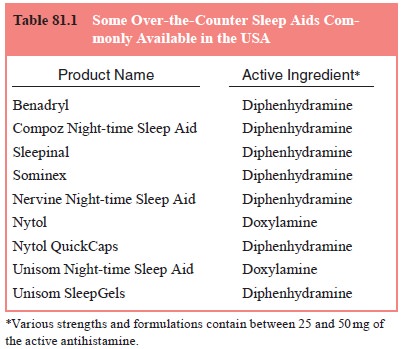Chapter: Essentials of Psychiatry: Sedative-Hypnotic Agents
Sedative-Hypnotic Agents: Nonprescription Agents
Nonprescription
Agents
There are
a number of over-the-counter (OTC) sleep aids used by patients suffering from
insomnia (see Table 81.1). These agents typically contain the histamine (H1)
receptor antagonist diphen-hydramine (e.g., Benadryl, Sominex) or some other
sedating anti-histamine such as doxylamine (e.g., Nytol, Unisom). While these
agents often cause significant drowsiness due to their antihis-taminic
properties, their effectiveness in treating insomnia has not been clearly
established in randomized, placebo-controlled studies. They tend to have a
prolonged duration of action leading to sedation and slowed reaction times
during the day following their use. In addition, tachyphylaxis often develops
within sev-eral days to a week or two limiting their use to only those patients
with short-term problems with insomnia.

The OTC
antihistamines are also highly anticholinergic and therefore may cause dry
mouth, constipation, urinary reten-tion and delirium quite easily. Geriatric
patients are particularly susceptible to these anticholinergic effects.
Patients already on other medications with significant anticholinergic activity
should take these compounds quite judiciously as the anticholinergic ef-fects
could be magnified.
The
common practice of combining an analgesic such as as-pirin or acetaminophen and
an antihistamine (e.g., Tylenol PM) is no more effective than the use of an
antihistamine alone unless pain is present. As such, their use cannot be
recommended for patients suffering from insomnia when pain is not a major
complaint.
Melatonin
is a naturally occurring pineal gland peptide hormone that is available in OTC
formulations from a number of manufacturers. The Food and Drug Administration
(FDA) classifies melatonin as a nutritive or dietary supplement. The Dietary
Supplement Health and Education Act does not require dietary supplements to be
reviewed by the FDA and, as a re-sult, the strength and purity of melatonin
cannot be guaranteed. When purified or synthesized and taken orally, melatonin
alters circadian rhythms, lowers core body temperature, and reduces daytime
alerting phenomena originating in the suprachiasmatic nucleus. Some clinicians
feel that melatonin may be particularly effective when the normal circadian
cycle is disrupted (e.g., jet lag, shift work). A number of studies have
yielded conflicting results regarding the efficacy and long-term safety of
melatonin. Efficacy data may be somewhat conflicting due to the lack of solid
data regarding appropriate dosing strategies. Efficacy has been reported with
doses as low as 0.3 mg at bedtime. While there are no known long-term safety
issues associated with the use of melatonin, treatment-emergent side effects
include pruri-tus, tachycardia, headache and daytime drowsiness.
Related Topics